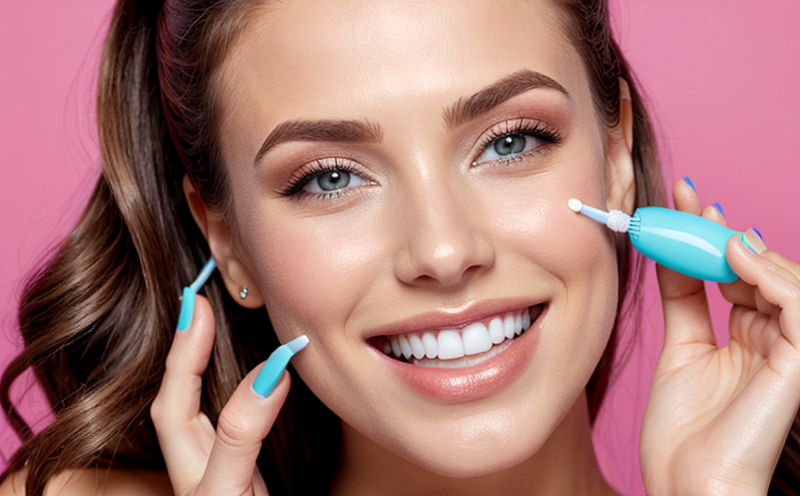Clinical Testing of Enzyme-Based Oral Care Cosmetics
The clinical testing of enzyme-based oral care cosmetics is a critical component in ensuring product safety and efficacy. This service involves comprehensive evaluations to assess the performance, stability, and potential adverse effects of enzymes within cosmetic formulations designed for oral use. The primary goal is to ensure that these products meet stringent regulatory standards while delivering effective results without causing harm.
Enzymes used in oral care cosmetics are biologically active substances that can significantly influence the mouth's environment. They play a crucial role in maintaining oral health by breaking down food particles and other residues, promoting better breath hygiene, and aiding in plaque removal. However, their presence also raises unique challenges regarding stability under various environmental conditions, compatibility with other ingredients, and potential interactions within the oral cavity.
The testing process begins with thorough formulation development followed by rigorous validation studies aimed at understanding how enzymes behave when mixed into cosmetic bases. This includes examining factors such as pH level, viscosity changes, and overall texture alterations. Once formulations are finalized, they undergo extensive stability assessments to determine shelf life under different storage conditions.
One key aspect of this service is the evaluation of enzyme activity in situ within the oral environment. This requires specialized equipment capable of simulating mouth conditions accurately—temperature ranges typical for human saliva pH levels—and measuring enzyme effectiveness quantitatively over time. Additionally, safety assessments are conducted to identify any potential risks associated with prolonged exposure or misuse.
Another important consideration is ensuring that these products do not interfere negatively with existing dental treatments or medical conditions. Therefore, compatibility tests are performed against various materials commonly found in dentistry and orthodontics alongside evaluations for allergenicity and irritation potential.
In summary, the clinical testing of enzyme-based oral care cosmetics encompasses a wide range of activities aimed at verifying product quality and safety. By employing advanced techniques and adhering strictly to established guidelines, laboratories can provide reliable data that supports informed decision-making processes throughout the development lifecycle.
Why It Matters
The importance of thorough clinical testing cannot be overstated when developing enzyme-based oral care cosmetics. Regulatory bodies worldwide require manufacturers to demonstrate not only efficacy but also safety across all intended uses and consumer segments. Meeting these requirements ensures that products meet the highest standards set forth by international organizations such as ISO, FDA (US), EMA (EU).
For instance, the US Food & Drug Administration mandates strict controls over the production of cosmetics containing active ingredients like enzymes due to their inherent biological activity. Similarly, European regulations emphasize the need for robust testing protocols to safeguard public health interests. Compliance with these standards helps protect consumers from potentially harmful substances while fostering trust in brand integrity.
Moreover, successful completion of clinical tests provides valuable insights into product performance under real-world conditions. This information allows manufacturers to optimize formulations further based on user feedback and emerging trends within the oral care market. Consequently, companies gain competitive advantages by delivering superior products that meet both regulatory expectations and consumer demands.
Benefits
The benefits of rigorous clinical testing extend beyond mere compliance; they offer tangible advantages for both manufacturers and consumers alike:
- Enhanced Consumer Trust: Compliance with stringent standards builds confidence among users about the safety and effectiveness of their chosen products.
- Better Product Performance: By identifying potential issues early in development, companies can refine formulations to improve overall efficacy without compromising on quality or safety.
- Informed Decision-Making: Extensive data gathered during testing enables informed decisions regarding marketing strategies and promotional activities aimed at specific demographic groups.
- Risk Mitigation: Early detection of risks allows for timely adjustments in formulation, packaging design, or labeling to minimize any adverse effects on consumers.
Ultimately, these benefits translate into improved brand reputation and increased market share for participating companies. Consumers benefit from safer, more effective products that contribute positively towards overall oral health management.
International Acceptance and Recognition
The global nature of the cosmetics industry necessitates uniformity in testing methodologies to ensure consistent quality standards across borders. Regulatory frameworks such as those established by ISO (International Organization for Standardization), FDA (United States Food & Drug Administration), EMA (European Medicines Agency) have played pivotal roles in harmonizing these practices.
ISO/IEC 17025, specifically tailored for laboratories involved in calibration and testing services, provides a framework that ensures the competence of organizations performing such activities. For enzyme-based oral care cosmetics, this standard emphasizes proficiency in areas including personnel qualifications, infrastructure requirements, method validation procedures, and ongoing quality assurance measures.
In addition to local regulations, international bodies like WHO (World Health Organization) also issue guidelines recommending best practices for evaluating cosmetic ingredients, particularly those involving biological activities. These recommendations focus on aspects such as toxicity assessments, allergenicity evaluations, and long-term safety studies.
Compliance with these internationally recognized standards not only facilitates easier market access but also enhances brand credibility globally. Companies that adhere to these protocols demonstrate their commitment to excellence in research and development, which ultimately leads to greater acceptance among international markets.





